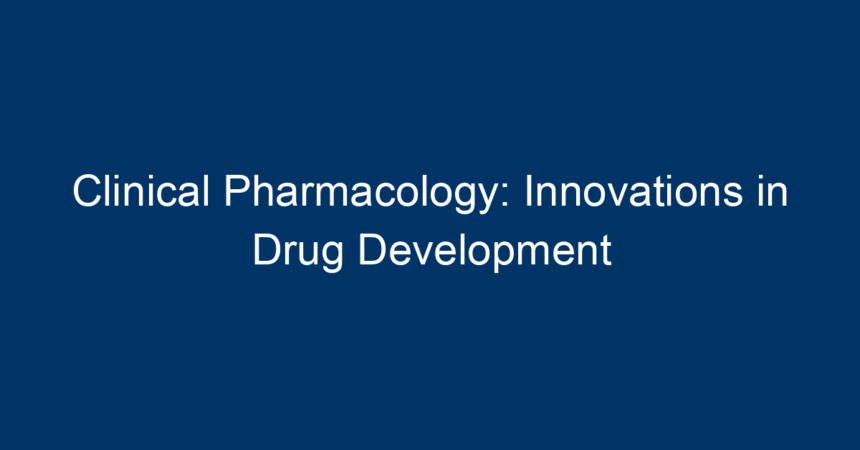Introduction
As the landscape of medicine continually evolves, clinical pharmacology stands at the forefront of innovation in drug development. Clinical pharmacology is the branch of medicine that focuses on how drugs interact with biological systems and how they can be efficiently and safely administered to treat various diseases. With the advancement of technologies and methodologies, the processes involved in drug development have witnessed groundbreaking changes. This article will explore the latest innovations in clinical pharmacology, highlighting how these advancements are revolutionizing the medical field.
Understanding Clinical Pharmacology
What is Clinical Pharmacology?
Clinical pharmacology is the study of drugs in humans. It encompasses the understanding of pharmacokinetics (how the body absorbs, distributes, metabolizes, and excretes drugs) and pharmacodynamics (the effects of drugs on the body). This discipline is crucial for developing new therapies, ensuring drug safety and efficacy, and tailoring treatments to individual patient needs.
The Role of Clinical Pharmacologists
Clinical pharmacologists play a vital role in drug development. They work collaboratively with researchers, healthcare professionals, and regulatory bodies to ensure that new medications are both safe and effective. Their expertise lies in understanding the diverse responses patients have to medications and determining the optimal dosages for different populations.
Innovations Transforming Drug Development
1. Personalized Medicine
The era of personalized medicine is reshaping clinical pharmacology by focusing on individual patient characteristics. Advances in genomics and biotechnology enable healthcare providers to tailor drug therapies based on a patient’s genetic makeup, lifestyle, and environmental factors. Personalized medicine aims to maximize therapeutic benefits while minimizing adverse effects.
Genomic Biomarkers
Genomic biomarkers are essential in identifying patients who are most likely to benefit from specific treatments. For example, certain cancer therapies are effective only for patients with specific genetic mutations. This targeted approach not only enhances drug efficacy but also reduces the trial-and-error method often associated with traditional drug prescribing.
2. Drug Repurposing
Drug repurposing involves finding new therapeutic uses for existing medications, an innovation that streamlines the drug development process. By repurposing drugs, researchers can bypass many of the costs and time associated with developing new compounds from scratch.
Cost-Efficiency and Speed
The clinical pharmacology field is leveraging existing knowledge about approved drugs to expedite the approval process for new indications. Since these medications have already undergone extensive testing for safety, their repurposing can significantly reduce development time and costs.
3. Advances in Drug Delivery Systems
Innovative drug delivery methods are a focal point within clinical pharmacology. These systems ensure that medications are delivered effectively to their target sites, optimizing therapeutic outcomes.
Nano-Delivery Systems
Nanotechnology is revolutionizing drug delivery by enabling medications to be transported directly to affected areas of the body. Nanoparticles can be designed to enhance drug solubility, stability, and absorption. This targeted approach not only increases efficacy but also reduces side effects.
4. Artificial Intelligence (AI) in Drug Development
AI is a game-changer for clinical pharmacology, especially in drug discovery and development. Machine learning algorithms can analyze vast datasets to identify potential drug candidates, predict their efficacy, and recommend optimal dosage frameworks.
Predictive Analytics
Using predictive analytics, researchers can simulate how drugs will behave in human bodies before they enter clinical trials. This innovation can significantly reduce failures in later-stage development and bring new drugs to market faster.
5. Digital Health Technologies
The integration of digital health technologies, such as wearable devices and mobile applications, significantly impacts clinical pharmacology. These technologies facilitate continuous monitoring of patient responses to medications, enabling real-time adjustments to treatment plans.
Enhancing Patient Engagement
Digital health tools improve patient engagement by allowing them to track their drug adherence and health metrics. This information can help healthcare providers make informed decisions, leading to better therapeutic outcomes.
The Future of Clinical Pharmacology
Regulatory Innovations
As drug development evolves, so too must regulatory frameworks. Agencies like the FDA are adapting their processes to accommodate new technologies and methodologies in clinical pharmacology. Expedited pathways and adaptive trial designs are examples of how regulatory bodies are fostering innovation while ensuring patient safety.
Interdisciplinary Collaboration
The future of clinical pharmacology lies in interdisciplinary collaboration. By integrating insights from pharmacology, genetics, data science, and clinical practice, healthcare providers can create more effective drug therapies that cater to diverse patient populations.
Actionable Insights for Healthcare Professionals
-
Stay Updated on Emerging Technologies: Healthcare professionals should continually educate themselves about the latest advancements in clinical pharmacology, including AI and personalized medicine.
-
Utilize Genomic Testing: Consider incorporating genomic testing into clinical practice to enhance drug selection and dosage personalization.
-
Explore Drug Repurposing Opportunities: Stay informed about ongoing research in drug repurposing to identify potential new uses for existing medications.
-
Embrace Digital Health Tools: Encourage the use of digital health technologies to monitor patient progress and improve compliance.
- Engage in Collaborative Research: Participate in interdisciplinary research initiatives to stay at the forefront of innovation in clinical pharmacology.
Conclusion
Clinical pharmacology is undergoing a remarkable transformation, driven by innovations that promise to enhance drug development and improve patient care. From personalized medicine and drug repurposing to AI and digital health technologies, the field is becoming more efficient at targeting specific health challenges. For healthcare professionals, keeping abreast of these advancements is essential for delivering optimal care. As we look to the future, a collaborative approach involving diverse disciplines will be key to unlocking the full potential of clinical pharmacology in developing groundbreaking therapies that change lives.




